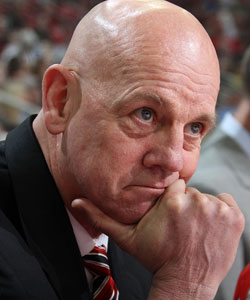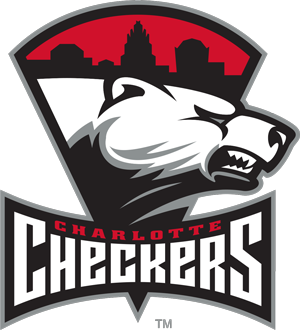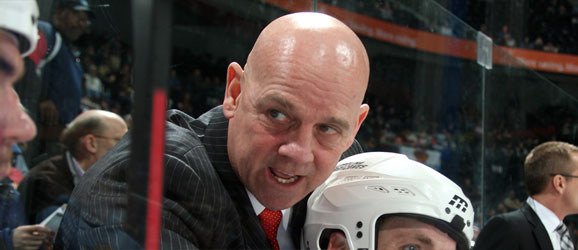Prior to the 2008-09 season, Rowe was the head coach of the Carolina Hurricanes’ AHL affiliate, then located in Albany. As part of a restructuring of the team’s hockey staff, he ended up switching places with a Hurricanes assistant coach named Jeff Daniels, who has held that job ever since.
The “trade” of sorts was designed to shake things up after a non-playoff year and enhance the resumes of both men, with Daniels getting his first head coaching experience and Rowe working in the NHL for the first time. Since then, it has taken each coach down a remarkably different path. In contrast to the stability of Daniels, who moved with the team to Charlotte and is now in his sixth season, Rowe, now in charge of the San Antonio Rampage, who are in town to play the Checkers this week, is in his third job since leaving the Carolina assistant position in 2011.
Rowe has only held his current post for a little over a month, making this week’s games the first time that he and Daniels have ever coached against each other and the first time Rowe has come into direct competition with the Carolina organization.
“It’s fun,” said Rowe following Tuesday’s morning skate. “This is coming home and seeing a lot of the guys I coached.”
His relationships with most of the current Checkers were built at the NHL level, where he’d work with them whenever the Hurricanes might happen to make recalls. However, he does have an interesting perspective on some of Charlotte’s most experienced players – holdovers from the early Albany days who have turned from fresh faces to seasoned veterans.

For anyone familiar with Blanchard’s play, it’s clear the message stuck.
“I was just talking to him today about how he’s got the same enthusiasm and same passion he had seven years ago,” said Rowe. “I’m not looking forward to coaching against him because I know he’s going to be a hard guy to play against, but it’s always good to see him.”
Then there’s defenseman Mark Flood, who the Hurricanes acquired via trade in his second professional season. He and Rowe spent two years together in Albany.
“He was hard on me and he was hard on a lot of the younger guys in Albany, but he turned out to be a big influence on my career,” said Flood, the oldest player on the Checkers at 29. “I was still a young guy and had some bad habits, and he taught me how to be a pro and how to be a man.”
The two ended up meshing so well that Rowe made an effort to bring Flood over to his most recent stop before arriving in San Antonio – Lokomotiv Yaroslavl of the Russian-based KHL last season.
“He got me over there and was a big reason why I stuck out the year there,” said Flood. “I knew his expectations and he knew what I could bring to the table, so it was a good relationship.”
“The thing I love about (Flood) is that he has the same personality every day,” said Rowe. “He’s not a moody guy, he’s a real pro and obviously he’s a good hockey player. He’s the type of guy you come to the rink every day and look forward to seeing.”
After the Hurricanes moved him from the bench to a pro scouting role in 2011, another front-office shakeup not unlike the one that landed him the assistant job, Rowe decided to take that position in Russia, which is actually where he started this season, coaching the first five games.
“They don’t have a lot of patience over there,” said Rowe, chuckling, of his early-season termination. “I got off to a 1-3-1 start and the president was frustrated. He thought we should win every game. Literally win every game.”
Even though his tenure in the KHL didn’t last quite as long as he had hoped – he and his wife, Bernice, had initially planned to complete that season before returning home – Rowe said that his experience with Lokomotiv was a positive one. In addition to giving him a fresh perspective on the European style of game and the creativity it allows players – something he’s now integrated into his own coaching philosophy – his was a situation unlike any other.
Many will recognize Lokomotiv as the club that lost virtually all of its players and coaches in a deadly plane crash in September of 2011. The team was unable to complete that season but resumed operations the following campaign with a roster full of new signings, players selected from other teams in a “disaster draft” and a new coach – Rowe.
“In that first game we had as a group in Moscow against Red Army, they estimated that about 800 to 1,000 fans showed up from Yaroslavl,” recalled Rowe of the 165-mile trip. “I was totally caught off guard when someone came up to me and told me that security wanted to take me out the back door of the arena. The security guy left for a minute and I ended up talking to someone I knew and went out the front door.
“I got swarmed by people that were just so emotional. A lot of them were crying and thanking us for coming over as coaches and players to help them rebuild the program. That’s when it really hit me. In Yaroslavl I’d be walking downtown and they’d recognize me from TV and would come over and give me a hug. That’s how emotional they were about the plane crash, and the memories are still fresh in everyone’s mind. The biggest thing was getting to a place where I understood it, but the emotional level of it was pretty incredible.”
It ended up being something that the team struggled with throughout the season.
“I had some great veteran leaders, and even though some of them spoke really good English and some of them didn’t, we found ways to communicate,” said Rowe. “They really held the young guys together when things got a little rocky or someone was a little choked up about what happened to one of their buddies, because that would happen. Everyone on the team either knew somebody or played with somebody or grew up with a guy on the plane. It was very, very difficult from that standpoint.”
After returning home, Rowe said he had been in discussions with a few different organizations about new career opportunities but jumped at the chance to take the head coaching job in San Antonio – one that suddenly became available when the Florida Panthers decided to fire Kevin Dineen and promote Rampage coach Peter Horachek on an interim basis. Since leaving his old post in Albany and trying a few different things, he now knows that this is what he wants.
“I’m just not an assistant,” he said. “I want to be a head guy and if I’m not a head guy I probably won’t coach anymore. It’s just the way I want to do it.”
After saying that, Rowe said he’d reconsider that policy for only two people whose coaching philosophies mirror that of his own. John Torchetti, who left the Houston Aeros to coach in the KHL last season, and current Checkers assistant Geordie Kinnear.
His relationship with the latter began when Kinnear, who had been an assistant with the club under the New Jersey Devils’ leadership but was out of a job when affiliations changed, reached out to Rowe and arranged what was supposed to be a one-hour lunch meeting. It ended up lasting five, as the two hit it off immediately.
Impressed but unable to make a proper hire due to budgetary contstraints, Rowe gave Kinnear permission to work with the team’s young defensemen – for free.
“He didn’t miss a day,” said Rowe. “He was there every single day, which was amazing to me. I told Jason Karmanos (then Carolina’s assistant general manager) about it and told him we were going to need an assistant, and since then, Carolina has never developed defensemen the way he has. In my opinion, he’s probably one of the premiere teachers at the minor-league level.”
“I got paid not in dollars and cents but in knowledge,” said Kinnear of that first year working with Rowe and then-assistant-coach Joe Sacco under what was a joint affiliation between Carolina and Colorado at the time. “Tom helped me out a lot and helped me be a better coach. I owe him a lot, for sure.”
Rowe was also complimentary toward Daniels, saying that the man he switched places with six years ago is “long overdue” for a head coaching job at the NHL level. It’s an opportunity Rowe still hopes to earn for himself, but for now, he’s just happy to be a head coach in North America again.
“I felt getting back to the American League and trying to get re-established down here was the best way to go,” he said. “If it works out long-term with an opportunity up top as a head guy then great, and if it doesn’t, I really like working at this level.”
With the Checkers and Rampage in the same division, Rowe and everyone he knows from the Checkers will have faced each other seven times by the end of the season, providing plenty of time to reminisce, not that they wouldn’t have done that anyway.
“Tom and I still keep in touch,” said Flood. “He’s a good coach and a good man.”





